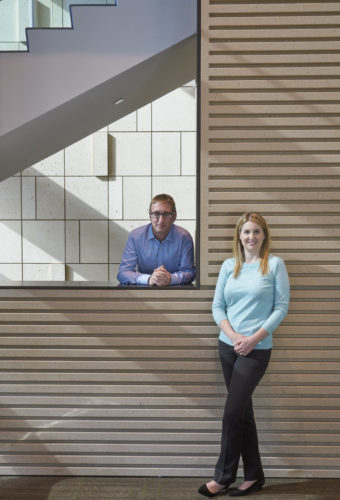Jacob Goldin: Assistant Professor of Law

This fall, the law school welcomes Assistant Professor Jacob Goldin to the faculty. An empirical researcher who combines an interest in tax policy with behavioral economics, Goldin was drawn to SLS in large part because of the faculty’s strength in interdisciplinary research.
Goldin, an Illinois native, is no stranger to the Bay Area. Following his graduation from Wesleyan College in 2007, where he received a BA in economics and government, Goldin and his wife lived in Oakland for a year.
“I knew I would be in graduate school for quite a while,” Goldin says, “and I wanted some time away from academia.”
So Goldin spent that year drafting gun-control measures for local governments at a nonprofit, campaigning for Obama, and, briefly, working at a bagel store.
“The trick is to get the bagels to taste different from bread. I never really mastered it,” he says.
During that year, Goldin also applied and was admitted to Yale Law School and Princeton. He deferred law school and began his graduate studies in economics at Princeton in 2008.
“I thought I would stop after a master’s degree, but I realized that I really liked doing the research myself, so I planned to finish the PhD and then become a legal academic,” says Goldin. He received his JD in 2014, clerked for Judge Richard Posner of the U.S. Court of Appeals for the Seventh Circuit, and then completed his PhD in 2015.
Although Goldin’s general interest in policy dates back to at least high school—he participated on the policy debate team—his scholarship focuses specifically on the application of insights from psychology and behavioral economics to taxes and other policies.
“We know from psychology and behavioral economics that the way a choice is designed affects behavior,” he explains. “I’m trying to use that research to design better policies, such as making it easier for low-income taxpayers to claim benefits they’re entitled to but might not know about.”
Goldin relies on his own research, as well as that of others, to inform his conclusions. This includes working with governments to create randomized controlled trials that generate data and doing statistical and theoretical analysis of previously collected data to find relevant information.
Goldin points to his ongoing work regarding tax preparation as illustrative of the type of research he hopes to undertake.
“Hundreds of thousands of low-income taxpayers make mistakes and miss benefits they’re entitled to because of how complicated the income tax rules are,” Goldin explains. “In this research, I’m designing experiments and analyzing data to find new ways to get folks to switch to free tax preparation services that avoid these problems.”
Indeed, Goldin had an opportunity this past year to apply his legal and policy training in the real world. Although invited to join the faculty in 2015, Goldin spent the 2015-2016 academic year as an SLS academic fellow while working in the Office of Tax Policy at the U.S. Treasury Department.
“Being in the Office of Tax Policy has allowed me to work with the IRS on drafting rules and regulations that affect low-income taxpayers, on issues like who is eligible for a subsidy to help purchase health insurance or which taxpayer gets to claim a child on his or her return,” he says. “It’s been a great experience.”
Goldin looks forward to bringing this experience to SLS, where he will teach federal income tax during the 2016-2017 academic year. He plans to add courses in tax policy and behavioral law and economics thereafter. He also hopes to find time for one of his hobbies—cooking—although bagels are still not among his specialties.
Above all else, however, Goldin says that he is “excited to join the SLS faculty and get to work with so many great people using tools from different disciplines to find ways to improve the law.”
Joseph Bankman, the Ralph M. Parsons Professor of Law and Business, who is a leading scholar in the application of psychology to tax policy, echoes Goldin’s enthusiasm: “Jacob is a leading new voice in tax law. He’s a lawyer and economist who focuses on how the law works in practice, not in theory. He’s an unassuming, sweet guy. Students are going to love him.”
